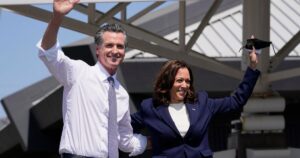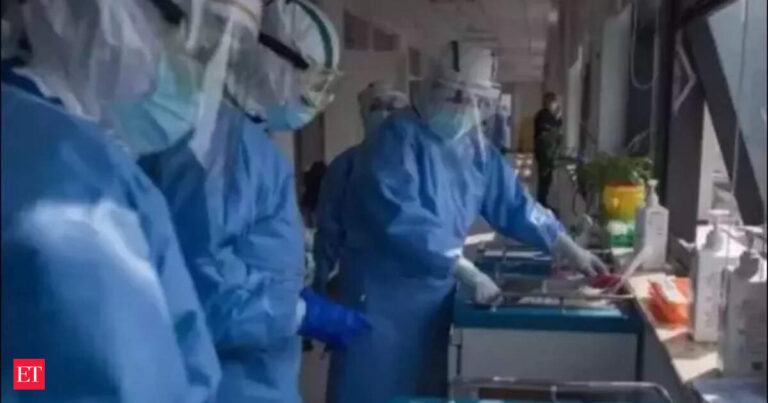US President Donald Trump made sharp remarks towards China as the US has implemented retaliatory tariffs with a goal of bridging the trade deficits with several countries. This has also impacted the stock markets.
Making the remarks on board US Air Force One, Trump said, “We have a tremendous deficit problem with China”.
He noted that because of the tariffs implemented by the US, “China is right now taking a big hit, because everyone knows we’re (the US) right… we’re talking about a trillion dollars. You know that, right? We’re not going to lose a trillion dollars for the privilege of buying pencils from China”.
Speaking about how the tariffs would affect the stock market, Trump added, “With the tariffs that I’ve already instituted, what’s going to happen with the market… I can tell you, our country has gotten a lot stronger, and eventually. It’ll be a country like no other. It’ll be the most dominant country economically in the world”.
On being asked about the bloodbath in the stock market, Trump added, “I don’t want anything to go down, but sometimes you have to take medicine to fix something.”
He criticised former US President Joe Biden and accused him saying, “We have been treated so badly by other countries because we had stupid leadership that allowed this to happen. They took our businesses, they took our money, they took our jobs, they moved it to Mexico, to Canada, they moved a lot of it to China, and it’s not sustainable. We’re not going to do it now. We have hundreds of millions of dollars is pouring into our country on a monthly basis. It’s pouring it’s already started, because they put tariffs on and eventually it’s going to straighten out, and our country will be solid and strong again”, Trump said in his remarks.
Asian stock markets witnessed a major sell-off on Monday after US President Donald Trump announced a new round of tariffs. The markets opened with heavy selling pressure, reflecting growing fears over the impact of the tariffs on global trade and economic growth.
US President Donald Trump made sharp remarks towards China as the US has implemented retaliatory tariffs with a goal of bridging the trade deficits with several countries. This has also impacted the stock markets.
Making the remarks on board US Air Force One, Trump said, “We have a tremendous deficit problem with China”.
He noted that because of the tariffs implemented by the US, “China is right now taking a big hit, because everyone knows we’re (the US) right… we’re talking about a trillion dollars. You know that, right? We’re not going to lose a trillion dollars for the privilege of buying pencils from China”.
Speaking about how the tariffs would affect the stock market, Trump added, “With the tariffs that I’ve already instituted, what’s going to happen with the market… I can tell you, our country has gotten a lot stronger, and eventually. It’ll be a country like no other. It’ll be the most dominant country economically in the world”.
Asian shares tumbled Monday after a sharp sell-off on Wall Street, triggered by US President Donald Trump’s tariff hikes and China’s backlash. US futures pointed to more losses, with the S&P 500 down 2.5%, the Dow Jones off 2.1%, and the Nasdaq falling 3.1%.
Tokyo’s Nikkei 225 sank nearly 8% at the open before recovering slightly to trade 6% lower by midday at 31,758.28. Trading of Topix futures was briefly halted by a circuit breaker following steep declines in US futures.
Chinese markets, which often diverge from global trends, also slumped. Hong Kong’s Hang Seng plunged 9.4% to 20,703.30, while the Shanghai Composite fell 6.2% to 3,134.98.
South Korea’s Kospi dropped 4.1% to 2,363.82, and Australia’s S&P/ASX 200 slid 3.8% to 7,377.70 after recovering from an earlier loss of more than 6%.
US President Donald Trump said Sunday that China would have agreed to a deal on the sale of TikTok if it were not for the tariffs imposed by Washington on Beijing last week.
Trump on Friday extended the deadline for TikTok to find a non-Chinese buyer or face a ban in the United States, allowing 75 more days to find a solution — a day after imposing additional 34 percent duties on all Chinese imports.
“The report is that we had a deal, pretty much for TikTok, not a deal, but pretty close, and then China changed the deal because of tariffs. If I gave a little cut in tariffs, they’d approve that deal in 15 minutes, which shows you the power of tariffs,” Trump told reporters aboard Air Force One.
The hugely popular video-sharing app, which has more than 170 million American users, is under threat from a US law passed last year that orders TikTok to split from its Chinese owner ByteDance or get shut down in the United States.
Asian markets plunged Monday amid growing fears of a global trade war, as US stock futures pointed to heavy losses on Wall Street following President Donald Trump’s escalating tariff measures.
Despite mounting concerns, Trump denied on Sunday that he was deliberately triggering a market selloff, saying he couldn’t predict how markets would react. “Sometimes you have to take medicine to fix something,” he said, referring to the market turmoil that has erased trillions in US company valuations since the onset of his tariff campaign.
Speaking aboard Air Force One, Trump said he had spoken with several world leaders over the weekend in an effort to find common ground, claiming, “They’re dying to make a deal.” But he reiterated that he wouldn’t agree to any trade deals unless the US trade deficit was addressed.
China, responding to US moves, announced Friday it would impose 34% tariffs on all American goods starting April 10 — news that broke after Asian markets closed last week, adding to the shockwaves felt Monday.
US President Donald Trump on Sunday said that he would not back down from his sweeping tariffs on imports unless countries balance their trade with the US. His stance comes despite the tariffs triggering market turmoil, raising recession fears, and disrupting the global trading system.
Speaking to reporters aboard Air Force One, Trump acknowledged he didn’t want global markets to crash but showed little concern over the sell-off, saying, “Sometimes you have to take medicine to fix something.”
His remarks came as markets were expected to continue sharp declines when trading resumed Monday. Trump’s aides attempted to ease fears, revealing that over 50 countries had reached out to negotiate the removal of the tariffs.
“I’ve spoken to many leaders from Europe, Asia, and around the world,” Trump said. “They’re eager to make a deal. I told them we’re not going to have deficits with your country. To me, a deficit is a loss. We’re aiming for surpluses or, at worst, breaking even.”
Top US officials announced on Sunday that over 50 countries targeted by President Donald Trump’s sweeping new tariffs have reached out to begin negotiations, as markets brace for economic fallout. The tariffs, set to take effect Wednesday, have triggered fears of a global recession and disrupted international trade.
Treasury Secretary Scott Bessent stated that unfair trade practices cannot be resolved quickly, emphasising the need to evaluate other countries’ offers. Trump, meanwhile, remained defiant, posting online, “WE WILL WIN. HANG TOUGH, it won’t be easy.”
Countries like China, Vietnam, and Israel are scrambling to respond, with Israeli Prime Minister Netanyahu scheduled to meet Trump to discuss tariffs alongside other issues. Vietnam has requested a reduction to zero tariffs if an agreement is reached.
White House economic adviser Kevin Hassett acknowledged the global backlash, saying countries are “angry and retaliating” but also engaging in talks. Commerce Secretary Howard Lutnick confirmed the tariffs would not be delayed, stressing their role in reshaping global trade.
In Congress, some Republicans support Trump’s approach, while others, like Senator John Barrasso, express concerns over market impacts. Meanwhile, billionaire Elon Musk called for zero tariffs, drawing criticism from White House trade adviser Peter Navarro.
Economist Lawrence Summers criticised the contradictory messages from Trump’s team, arguing that permanent tariffs could harm US businesses and global relations.
Vietnam has requested a 45-day delay on the US’s new 46% tariffs, as the country’s economy grew slightly slower in the first quarter. The Southeast Asian manufacturing hub, which relies heavily on the US as its top export market, faces the brunt of President Donald Trump’s aggressive trade measures announced last Wednesday.
In a formal letter to Trump, Vietnamese leader To Lam sought time to negotiate, appointing Deputy Prime Minister Ho Duc Phoc as the primary contact for talks. Lam also expressed hopes to meet Trump in Washington at the end of May to finalise an agreement.
Despite the looming tariffs, Vietnam’s GDP grew 6.93% year-on-year in Q1, a slight drop from the previous quarter’s 7.55% growth. Prime Minister Pham Minh Chinh remains committed to the government’s target of at least 8% growth for the year, with plans to boost growth in the remaining quarters.
Experts warn the tariffs could significantly damage Vietnam’s export-driven economy, potentially cutting GDP by 3% in the worst case. Key industries like seafood, textiles, and electronics are expected to be hardest hit. US firms such as Nike and Adidas, with manufacturing in Vietnam, may face reduced orders and job cuts.
Business groups have urged the US to delay tariffs amid growing economic uncertainty.
UK Prime Minister Keir Starmer declared on Sunday that “the world as we knew it has gone,” as global markets brace for the economic fallout from US tariffs. Writing in the Sunday Telegraph, Starmer warned that President Donald Trump’s sweeping tariffs signal a shift where “old assumptions can no longer be taken for granted.”
He suggested the UK may need to step in to protect businesses, with future economic strategies driven less by established rules and more by “deals and alliances.” The tariffs, including a 34% levy on Chinese goods and reciprocal measures from Beijing, are set to escalate global tensions. The EU and Japan also face significant increases, raising fears of recessions in major economies.
Starmer, who has engaged with EU leaders, stressed that Britain’s response should reflect “cool heads, pragmatism, and a clear understanding of our national interest.” He emphasised that the UK would only pursue a US trade deal if it served British businesses, with “all options on the table” to counteract the tariffs.
In response to the shifting global landscape, Starmer signalled readiness for state intervention to support key industries, promising measures to boost domestic competitiveness amid the turmoil.
Economy Candy’s shelves are stacked with sweets from around the globe—German gummies, Spanish lollipops, Japanese chocolates, and a variety of American treats. Amidst this colourful array, owner Mitchell Cohen is clear-eyed about the impact of President Donald Trump’s sweeping tariffs.
“I think all of them,” Cohen says, eyeing the store’s 2,000-plus items. The tariffs, set to rise sharply, have left few sectors untouched, even small shops like his. Just as inflation-driven price hikes were easing, the tariffs arrived, threatening to push costs higher.
Cohen, who took over the family business in New York’s Lower East Side, fears the new financial strain. “I think it’s gonna be another round of hyperinflation on some items,” says the 39-year-old. Economy Candy, with its vintage red sign and nostalgic charm, has weathered tough times before—from 9/11’s tourist drop to the pandemic’s shutdowns.
Now, even American-made candies are affected. Products like Snickers rely on global ingredients—cocoa from Guyana, sugar from Brazil, and packaging from Canada—all subject to tariffs. Imported treats, from French Milka bars to Japanese Kit Kats, face steep duties too.
As costs rise, Cohen worries about maintaining affordability. “When your margins come down, you really start to feel it,” he says, uncertain how to adapt if tariffs continue to climb.
Despite the challenges, Cohen remains hopeful, determined to keep Economy Candy a sweet escape for visitors.
More than 50 countries have sought talks with President Donald Trump in a bid to ease severe tariffs on exports to the United States, the White House announced on Sunday, as global trade partners braced for further repercussions.
Since imposing a sweeping range of tariffs on Wednesday, Trump has remained defiant, insisting his policies “will never change” despite a sharp market downturn. He later visited the golf course, as noted in his post on Truth Social.
Israeli Prime Minister Benjamin Netanyahu, whose country faces 17% tariffs despite being a close US ally, is scheduled for key discussions with Trump on Monday regarding the levies.
UK Prime Minister Keir Starmer warned in a newspaper op-ed that “the world as we knew it has gone,” highlighting the increasing importance of “deals and alliances” in the new global landscape.
Trump’s staggered deadlines have allowed some room for negotiations, though his administration has cautioned against retaliation. “Over 50 countries have reached out to the president to begin negotiations,” said Kevin Hassett, head of the White House National Economic Council.
Vietnam, whose largest export market is the US, has requested a delay of at least 45 days to the 46% tariffs imposed by Trump.
Despite efforts to mitigate the economic fallout, fears persist of continued market turbulence. In Saudi Arabia, the stock market dropped 6.78%—the worst since the COVID-19 pandemic. Economists warn of further instability, while Trump’s trade advisor, Peter Navarro, remains confident in the long-term benefits of the tariffs.











